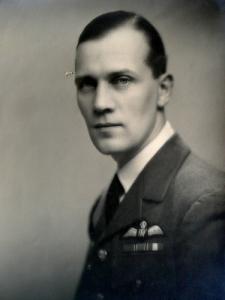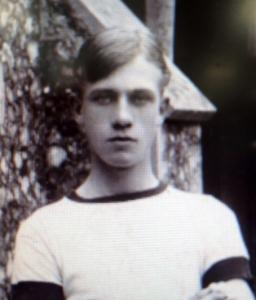
|

|
| Wing Commander Arthur Noble LUXMOORE (28112) | |
|
144 Squadron Royal Air Force Date of birth: 24th February 1909 Date of death: 12th May 1940 Killed in action aged 31 Buried at Finnevaux Communal Cemetery |

|
| Arthur Noble Luxmoore was born at Newton Abbott in Devon on the 24th of February 1909 the twin son of Major Launcelot Alfred Luxmoore, Royal Artillery, and Charlotte Evelyn Constance (nee James) Luxmoore of "The Roundel", Rye in Sussex. He was educated at Lancing College where he was in Heads House from September 1922 to July 1928. He was a member of the Cricket XI in 1927 and 1928 being Secretary in the latter year. He was a member of the Boxing team in 1925 and 1926 and the Athletics Team in 1927 and 1928. He gained his School Certificate in 1927 and was a Cadet Officer in the Officer Training Corps achieving Certificate A. He went on to Hertford College Oxford in 1928. He was commissioned as a Pilot Officer in the Royal Air Force on a short service commission on the 15th of August 1929 and was posted to the Royal Air Force Depot at Uxbridge. He was promoted to Flying Officer on the 14th of April 1931. On the 16th of June 1933 he was posted to No. 3 Armament Camp at Sutton Bridge and on the 30th of October 1933 he was posted to the Air Armaments School at Eastchurch. On the 15th of December 1933 he was posted to the Anti Aircraft Co-Operation Flight at Biggin Hill. On the 17th of December 1934 he was posted to 43 Squadron at Tangmere and on the 23rd of April 1935 he was posted to 25 Squadron at Hawkinge. He was married to Annette Rosemary (nee Pugh) at the Church of St James the Less at Litchfield on the 20th of March 1935. They had a son, Fairfax, born on the 18th of July 1940. After his death she was remarried to Patrick Vincent Lawford in 1944. Shortly after he was married he was posted to Egypt. He was promoted to Probationary Flight Lieutenant on the 15th of March 1935, a rank which was confirmed on the 1st of June 1936 when he was granted a permanent commission. On the 24th of February 1937 he was posted to the Electrical and Wireless School at RAF Cranwell. He was promoted to Squadron Leader on the 1st of August 1938 and was Commanding Officer of 144 Squadron at the time of his death. On the 11th of May 1940 37 aircraft from Bomber Command, being 19 Hampden and 18 Whitley bombers, were despatched for an operation on Monchengladbach to bomb road and rail links in the area in an attempt to impede the advance of the German forces which had attacked the Low Countries the week before. This was the first bombing raid on a German town of the war. Arthur Luxmoore and his crew took off from RAF Hemswell at around 10.30pm on the 11th of May 1940 in Hampden MkB1, P1326 PL-? for the operation. At 12.30 am they were at 6,000 feet and approaching the target area when they were hit by flak several times which caused severe damage to the starboard engine and to the rudder controls. Arthur Luxmoore managed to steer the stricken bomber in a westerly direction, slowly losing height. An hour after being hit, with the starboard engine having stopped, he ordered his crew to bail out and all three landed safely on the Allied side of the Maginot Line. They returned to Hemswell two days later. Sadly Arthur Luxmoore did not escape from the aircraft and was killed when it crashed near Finnevaux (Namur), 11 kilometres south, south east of Dinant in Belgium at 1.20am. The crew was:- Wing Commander Arthur Noble Luxmoore (Pilot) Pilot Officer Robert Edward Allitt (2nd Pilot/Air Bomber) (Killed in action on the 23rd of February 1944) Sergeant Herbert Wathey (Navigator/Air Gunner) (Killed in action on the 12th of February 1942) Corporal Ronald Jolly (Wireless Operator/Air Gunner) (Killed in action on the 13th of June 1940) Theirs was one of three aircraft lost on the raid. His wife received the following telegram dated the 14th of May 1940: - "Regret to inform you that your husband Acting Wing Commander Arthur Noble Luxmoore is missing as the result of air operations on 12th May 1940. Letter follows. Any further information will be immediately communicated to you." The local burgomeister, having seen the aircraft crash, set out for the crash site where he was assisted by other villagers in removing the body from the wreckage and burying it close by. It was exhumed and reburied at its present site in August 1940 under a cross which identified him as an unknown English airman. In January 1945 members of the 398th Company, Royal Army Service Corps identified his body when they recovered the makers plate from one of the engines. Both Jolly and Wathey were awarded the Distinguished Flying Medal and Allitt was awarded the Distinguished Flying Cross. The citation for Herbert Wathney's award read as follows: - "This airman was air gunner and observer in an aircraft engaged in an attack on a target at Gladbach-Rheydt on a might in May 1940. Although the aircraft was hit at least five times and severely damaged, one engine being stopped and the rudder controls shot away, he continued firing his gun on enemy searchlights and succeeded in putting two of them out of action. When the aircraft was almost unmanageable he assisted the pilot to keep a straight course. His coolness and courage materially assisted a flight of over 100 miles to a place in friendly territory where the crew could abandon the aircraft." On his return to England Robert Allitt wrote a letter from 110 Ardington Road, Northampton to Annette Luxmoore dated the 19th of May 1940:- "Dear Mrs Luxmoore, Your address, through Wing Commander Jordan, has just reached me or I should have written sooner. I think he has already told you that I was with your husband last week. Although I can tell you little more than you already know, I thought you might like to hear from me as I was in his aircraft. We took off at about 10.30pm on Saturday and, when over Germany about two hours later the aircraft was hit and badly crippled. Fortunately none of us were hurt. Thanks to the magnificent piloting of the Wing Commander we managed to reach friendly territory in Belgium, where he ordered us to abandon the aircraft by parachute. He of course was the last to leave. Throughout he was apparently unperturbed, and I feel that there is every chance that we may yet hear from him. Only flying people can appreciate to the full his superb handling of the almost completely disabled aircraft. The rest of us owe our lives to him, and could not express in words our admiration and gratitude. This was our eighth raid together and I shall miss his leadership and comradeship terribly. I do hope you will accept my sincere sympathy in your great anxiety. If there is anything I can do to help please let me know." |
|
 | |
| Heads House |
Back